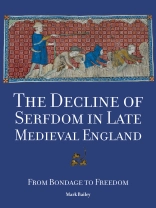An exciting, fresh look at one of the most important questions of medieval scholarship – the decline of serfdom and its implications.
Scholars from various disciplines have long debated why western Europe in general, and England in particular, led the transition from feudalism to capitalism. The decline of serfdom between c.1300 and c.1500 in England is centralto this ‘Transition Debate’, because it transformed the lives of ordinary people and opened up the markets in land and labour. Yet, despite its historical importance, there has been no major survey or reassessment of decline of serfdom for decades. Consequently, the debate over its causes, and its legacy to early modern England, remains unresolved.
This dazzling study provides an accessible and up-to-date survey of the decline of serfdom in England, applying a new methodology for establishing both its chronology and causes to thousands of court rolls from 38 manors located across the south Midlands and East Anglia. It presents a ground-breaking reassessment, challenging many of the traditional interpretations of the economy and society of late-medieval England, and, indeed, of the very nature of serfdom itself.
Mark Bailey is High Master of St Paul’s School, and Professor of Later Medieval History at the University of East Anglia. He has published extensively on the economic and social history of England between c.1200 and c.1500, including
Medieval Suffolk (2007).
Table des matières
The Decline of Serfdom and its Historical Significance
The Chronology of Decline: Villein Tenures
The Chronology of Decline: Servile Incidents
The Causes of Decline
Reassessing the Decline of Serfdom: Method and Sources
Walsham-le-Willows
Merton College, Oxford
Aldham
Tingewick and Upper Heyford
The Abbot of Bury St Edmunds
The Dukes of Norfolk
Miscellaneous Manors
The Chronology of the Decline of Serfdom
From Bondage to Freedom: Towards a Reassessment
Appendix: List of original sources used in this study
Bibliography
A propos de l’auteur
MARK BAILEY was recently High Master of St Paul’s School, London, and a visiting fellow of All Souls College, Oxford. He was previously a fellow of Corpus Christi College, Cambridge, and is now the Professor of Later Medieval History at the University of East Anglia. His numerous publications include Medieval Suffolk. An economic and social history 1200-1500 (2007) and After the Black Death. Economy, society and the law in fourteenth-century England (2021).












